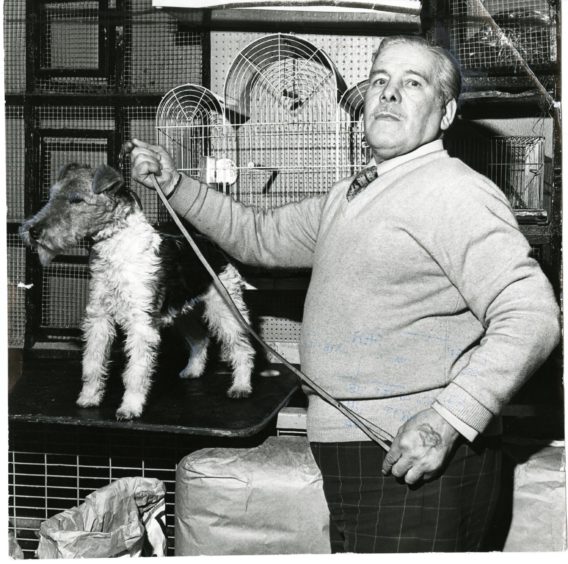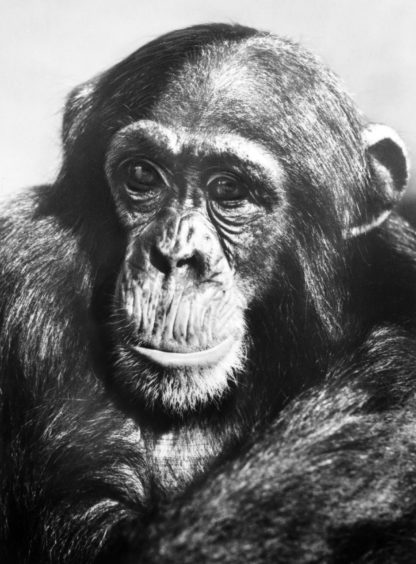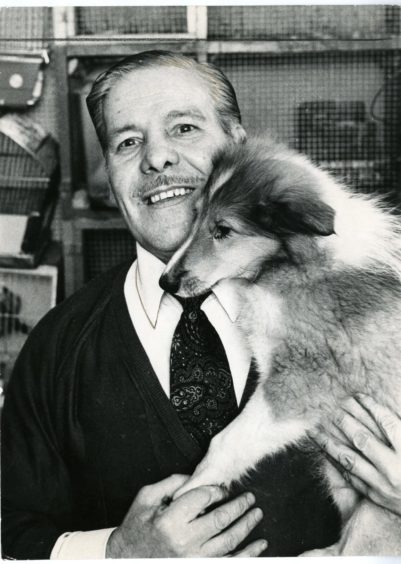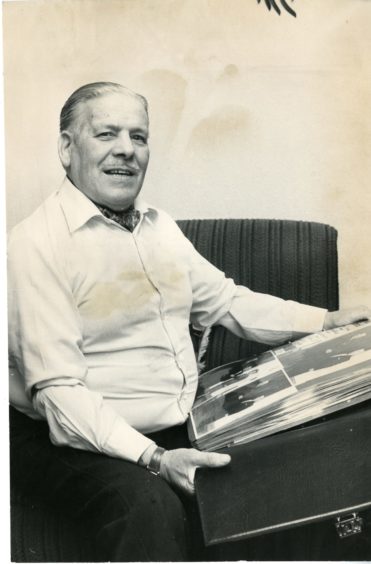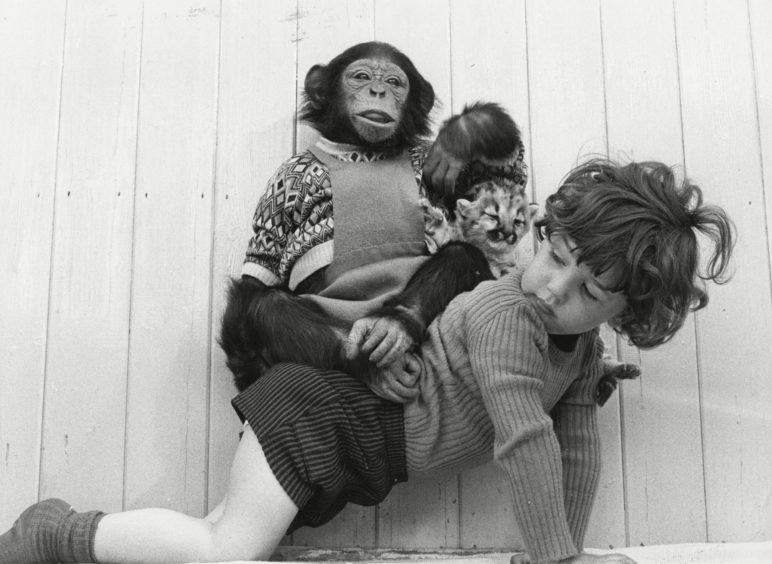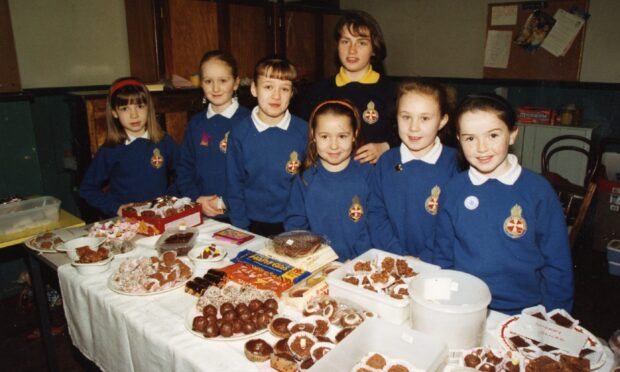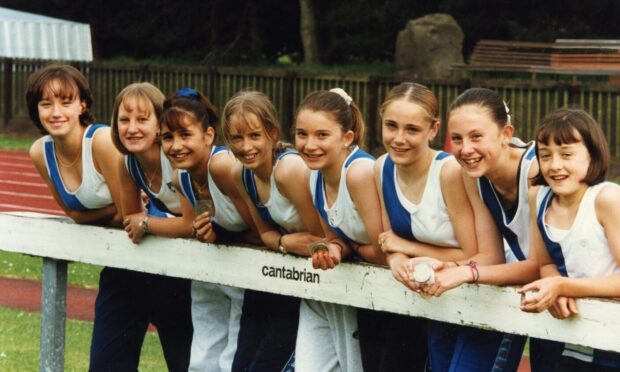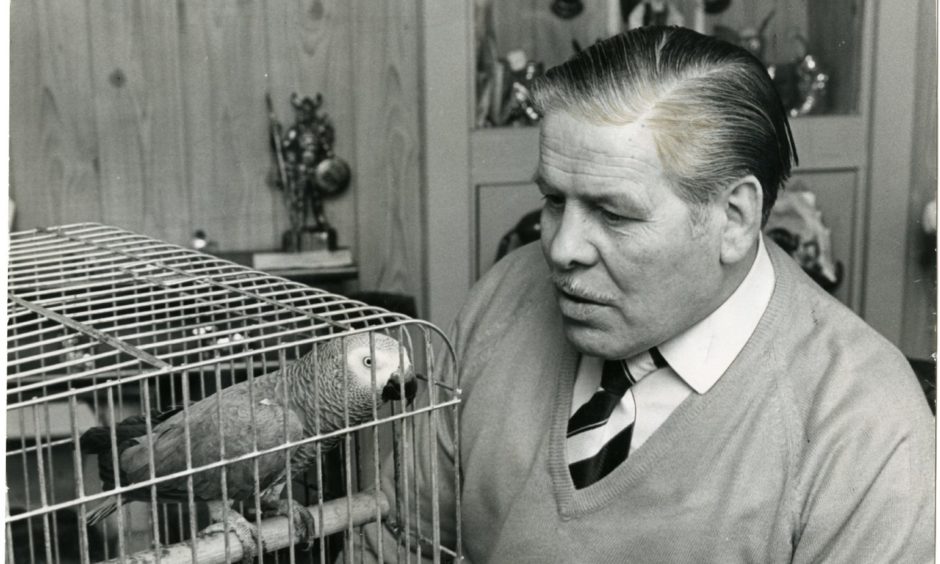
Singing parrots, strong-armed monkeys and an adventure-seeking nanny goat.
These were among the weird and wonderful animals owned by legendary Dundee pet shop owner Jockie Smith.
Jockie, who was known as the ‘doggy man’ by children, kept animals in the days when you didn’t need to have a pet licence.
Dog clippers
Brought up in Hawkhill, Jockie left Balfour Street Public School aged 14 and went to work at the Peter Street pet shop under an old friend James Hennessy.
After being demobbed from the navy in 1943, Jockie’s business ventures started with a small pet store in Princes Street where he stayed for two years before he finally settled at the Overgate – which included monkeys for sale.
The Overgate at the time was full of colourful characters but times were hard after the Second World War with shops selling bread by the slice and Jockie would give out free haircuts to some of the old men using his dog clippers.
Some of the monkeys Jockie did keep in his pet shop were incredibly strong.
Jockie was sitting fast asleep one time and a monkey reached out and picked him right out of the chair.
It then skipped up on to the sideboard and knocked over the radio that was there, which had acid batteries, and the acid fell over into the sugar, which was rationed at the time.
Jockie would advertise for monkeys in the Courier newspaper.
One day he received a call following his advert and was offered a monkey for sale which he agreed to buy.
He sent his assistant to go and collect the animal and bring it back on the bus.
Jockie received a frantic call from his assistant who got there to discover it was a chimpanzee in a cage.
Jockie managed to bring it back to the Overgate by crane where it duly escaped and ended up on the roof of the building.
The fire brigade were called out to rescue it.
Another time a nanny goat managed to wander off from his back garden, and fell through the roof of the Brown Street School, although thankfully it wasn’t hurt.
Jockie’s shops became an institution with thousands of children getting their puppies, gerbils, rabbits or white mice from him.
Jockie stocked mainly household pets as well as canaries, but he liked them so much that he never used to sell them, but kept them for years in the shop for himself.
Scottish songs
One of his favourites was an African Grey parrot called Rabbie.
He was a remarkable talker and Jockie trained him to sing all the Scots songs, like My Bonnie Highland Lassie and Donald Whaurs Yer Troosers, and he could pick them up in about a week.
Rabbie also used to nag the pet dog Jockie had at the time, telling it to lie in its basket or fetch its ball, and, not only could it imitate Jockie’s voice, but it could imitate his wife Martha’s as well.
They sent a tape of it to an ornithologist in America, and she wrote an article about it, saying it was the best talker she’d ever heard.
Jockie’s daughter Ruth MacLeish said it was a happy childhood which also brought its fair share of monkey business!
“We used to keep a pet monkey in the house growing up,” she said.
“I used to push her up the street in a doll’s pram but she was gone in a few months.
“I went out with my mum one evening and we came back and the monkey was swinging from the lights.
“In those days the radio was powered by an accumulator and she had pulled out all of the wires from the battery.”
Jockie also spent 30 years boxing throughout Scotland and during these tours, he met and became friends with many of the great entertainers of the day, including Hector Nicol, Chic Murray, Jimmy Logan, Johnny Victory and Lex McLean who was described as “almost certainly the last of Scotland’s great music hall comedians”.
McLean once put an advert in the paper, saying that Jockie was looking for an assistant and saying that he would pay the impossible sum as £20 per week plus board and lodgings.
When Jockie arrived at the shop that morning, there was a queue of people stretching right up to Tay Street.
Hilltown
Jockie and his wife Martha had to leave the old Overgate to make way for new developments and they moved to premises in the Hilltown.
They moved to a shop next to the Plaza in Ann Street before he moved again to 213 Hilltown where he stayed until retiring in 1985 at the age of 70.
He was also a rat-catcher for the town council when he wasn’t working in the pet shop.
“I had a very happy childhood and there was never a dull moment,” said Mrs MacLeish, 81, who has three grown-up children, six grandchildren and nine great-grandchildren.
“He enjoyed many happy days in the pet trade and I know he missed the children coming in every day when he retired.
“He died in 1991 but I’m so happy that he is still being remembered to this day.”
Arthur Patterson published a book on how to manage a pet monkey
Monkeys imported from the colonies by sailors or dealers started to become popular pets in the Victorian era.
Because of the monkey’s popularity, in 1888, Arthur Patterson published a book called Notes on Pet Monkeys and How to Manage Them.
In its favourable review, the following year, Blackwood’s Edinburgh Magazine said the book was full of “charming descriptions” and “amusing stories,” and proclaimed that “after reading this little work on pet monkeys, one feels inclined to go and buy one”.
Patterson’s book includes a price list for various breeds of monkeys, revealing that marmosets could be had for 15 shillings whereas an orangutan could be as much as £100.
Objectionable
In the book he distinguished between monkeys that were “fuller of devilry” and ones that possessed an “effervescence of fun” and gives advice on how to choose a companion and build a simple cage, what to feed them and how to care for them.
“The right place for a monkey, in civilised society, is in a cage,” said Patterson.
Many people kept their pet monkeys on a barrel and pole but Patterson advised against this set up, calling it ‘barbarous’ and warning that the monkey may ‘pelt you with refuse from his larder’ and ‘be objectionable’.
Although keeping a wild monkey as a pet seems unnecessarily cruel, Patterson’s closing thoughts suggested that despite his misguided ideas he did have a genuine affection for monkeys.
“Lastly, I would urge upon the reader not to neglect his little friend: to give him all the room and exercise possible; to provide him with a plentiful supply of clean, sweet food; always keep his domicile in a clean condition – in fact, in every possible way to make the little prisoner, who is entirely at his mercy, as happy as possible.”
